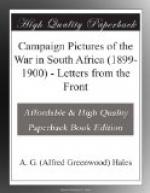It is not from such great men as Roberts that we hear these pitiful tales concerning those who give us battle. He who has been a man of war from childhood to old age would never stoop to soil his manly lips to woo the fleeting favours of a mob, and he has proved himself as wise in council as upon the death-strewn fields of war. So wise, so brave, so loyal to his word, that even those whom he, at his country’s call, has had to crush, lift their hats reverently at the mention of his name, because he wears upon his hero soul the white flower of a blameless life. Would Kitchener, whose dread name strikes terror to the heart of every burgher, would he befoul his foeman’s fame? I tell you no, though whilst a foe remains in arms he strikes with all a giant’s force and spares not; but when the blow has fallen, he of all men would preserve his enemies’ fair fame intact. So it should be whilst those who stand in arms against our country and our country’s flag refuse the terms we offer. We should make war so terrible that every enemy should dread the sound of British bugles as they would dread the trump of doom. When once the country’s voice has called for war, then war should sweep with resistless might over land and sea, until sweet peace should seem a boon to be desired above all earthly things by those who stand in arms against us. If Steyn and those who with heroic hearts hedge him round refuse to bow to destiny and the God of Battles, then he and they must fall before the bayonets of our soldiery as growing corn falls before the sickle of the reaper. But even in their fall they can claim as their heaven-born heritage our nation’s deepest admiration for their dauntless devotion to their love of country, home, and kindred. And we will but add laurels to the renown our soldiers have won if we, with unsparing hand, mete out to them the praises due to manly foes. Ours be the task to slay them where they stand; not ours the task to rob them of the glory they have won.
LOUIS
BOTHA,
COMMANDANT-GENERAL OF THE
BOER ARMY.
Louis Botha, who has cut so deep a mark in the pages of history, is only a young man yet, being about seven-and-thirty years of age. He is a “fine figure of a man,” standing in the neighbourhood of six feet in his boots. His face is handsome, intellectual, and determined; his expression kindly and compassionate. The razor never touches his face, but his brown beard is always neatly trimmed, for the young Commandant-General is particular in regard to his personal appearance in a manly way, though in no respect foppish. He is now, and always has been, an excellent athlete, a good rifle shot, and a first-class horseman; not given at any time to indoor pastimes over much, though fond of a quiet game of whist. He was born in Natal, of Dutch parents, and married to Miss Emmett, a relative of Robert Emmett, the Irish Revolutionist. Young Botha was educated at Greytown, and though a good, sound commercial scholar, he gave no evidence




